Musical theater met Kahil El’Zabar & Co.'s jazz in perfect harmony at Encore

The “great American songbook” and jazz have always had a strong relationship. Popular songs have been an important source for jazz improvisation from the very beginning and jazz has influenced popular music composers to adapt dynamic rhythms, blue notes, and the uptempo style of the emerging jazz players of the 1920s.
The Encore Theater is celebrating Black heritage with an exciting pair of musical reviews this month. On February 18, a program called Modern Jazz Meets Musical Theater made a strong case that the popular music of the golden age from the 1920s to the 1950s was a collaboration of a diverse group of performers and composers that is still rich and vibrant today. Many of those who created the American Songbook were first-generation immigrants from Europe and Black Americans who found a common voice.
The man making that case is, as the Encore program says, the legendary Kahil El’Zabar, an inspired percussionist, driving band leader, and wise teacher. El‘Zabar and his Ethnic Heritage Ensemble joined forces with four superb singers to give us a sampling of show tunes, blues, and pop standards in a smokey setting on the Encore stage. Each song segued from vocalist and band to rich, lively, thought-provoking jazz improvisations on the music and then rounded back to the singers.
Giving 'Em Hell: Fred Grandy captures the complex character of Harry Truman in a one-man play at Encore
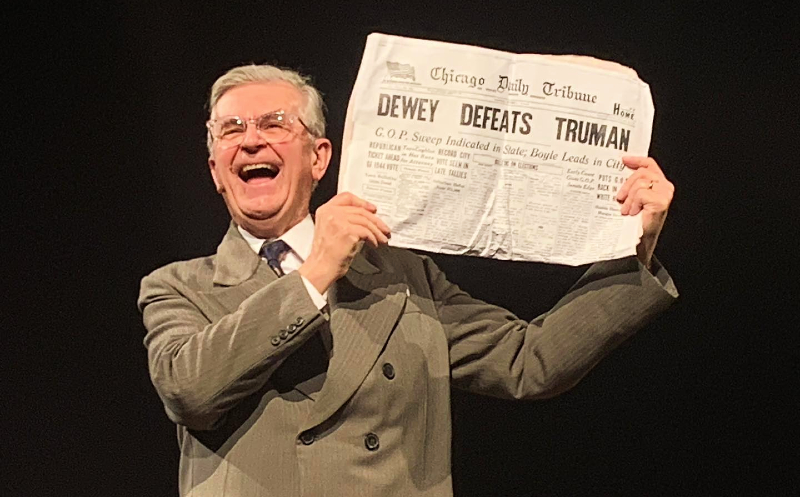
Fred Grandy served four terms as a Republican congressman from Iowa. Grandy is an actor who quit his role as Gopher Smith on the popular television series Love Boat to enter the partisan and always contentious world of politics (and sometimes governance?).
In these particularly partisan times, Grandy is touring in the one-man play Give ‘Em Hell Harry as that most Democrat of presidents Harry Truman.
Encore Theater is taking a break from musicals to present this surprisingly relevant look back at Truman’s crucial and politically charged presidency in his own words.
Truman didn’t seek the presidency, it was thrust upon him. He had been plucked from his seat as a senator from Missouri to run with Franklin Delano Roosevelt, who was seeking his fourth term.
When Roosevelt died just four months into his new term, Truman took office while the United States was still at war. He had never been taken into Roosevelt’s confidence and he hadn’t been informed that an atomic bomb had been developed, and the decision on whether to use it or not fell on him.
Truman had a reputation as a blunt and honest man. As a senator, he led a committee to investigate waste and corruption in the war effort. He even challenged his president on several issues. But he was dedicated to the New Deal and Roosevelt’s transformative presidency. He was not FDR, but he brought a common sense, down-to-earth approach to an overwhelming position.
Harry Truman never minced words. He was blunt, uncensored, and proudly partisan. But this people’s president was also a good storyteller, slyly humorous, and tried with some success to work with those on the other side of the partisan divide, while also zinging them and their conservative views.
Theatre Nova celebrates the season with song, dance, and silliness in "An Almost British Christmas"

‘Tis the season to make jolly. ‘Tis also the season to be silly.
British music halls celebrate Christmastime with pantos (short for pantomime, but not really about mimes). A panto is a play based on a fairy tale that provides a framework for slapstick, satire, song parodies, dancing, clowning, a touch of bawdiness and lots of good cheer to see out the year.
Several years ago, Carla Milarch, founding director of Theatre Nova, and R. MacKenzie Lewis introduced the panto to Ann Arbor with An Almost British Christmas. Every Christmas season since (except for last year, of course) Nova has presented a new panto. This year Nova is reviving the original show, more or less, with some topical humor to fit this particular year.
But it’s really the silliness that counts.
U-M's production of Shakespeare’s "A Midsummer Night’s Dream" is all about the love—and the laughs

William Shakespeare’s A Midsummer Night’s Dream is one of the Bard’s most popular comedies and one of the most accessible for modern audiences.
And why not?
It has a little bit of everything for everybody.
There’s 16th-century style rom-com, fairies with magic spells and love potions, and a hilarious troupe of amateur thespians who are preparing a show for a royal wedding.
The University of Michigan Department of Musical Theatre will present a production of A Midsummer Night’s Dream Dec. 2-5 in the Arthur Miller Theater, directed by Vincent Cardinal.
“Why I think it’s popular is that at its core it’s about love and about our impulses to find love and to find people to love and how complicated that is and how it works in the larger structure of our society as well as our personal lives,” Cardinal said. “So it’s examining issues that are core to what it is to be a human being.”
U-M mines Ayad Akhtar's "Junk: The Golden Age of Debt" and the impact of the 1980s bonds scandal
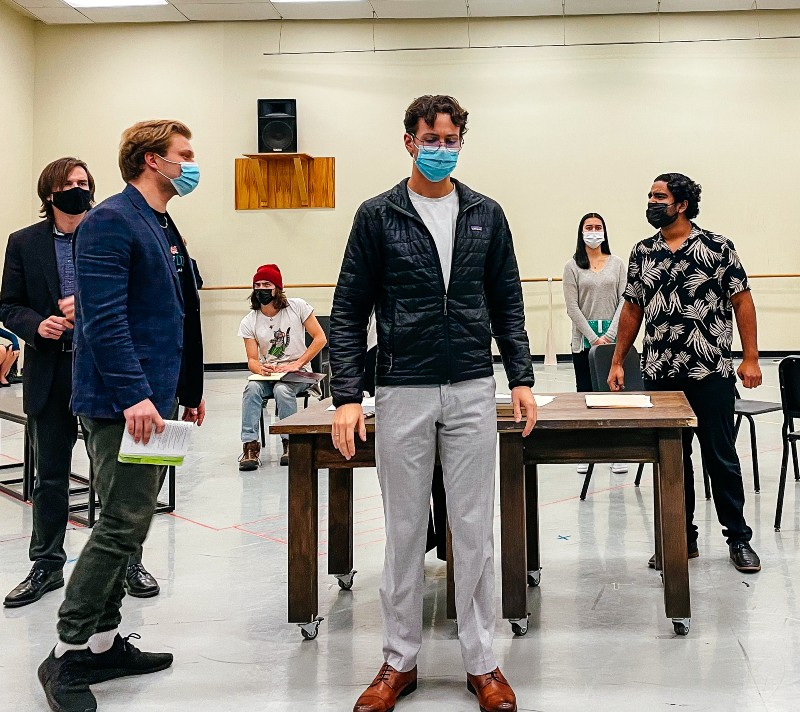
In Oliver Stone’s movie Wall Street, investor Gordon Gekko sums up what capitalism is all about from his point of view: “Greed is good.”
Playwright Ayad Akhtar takes a more nuanced look at American finance in his play Junk: The Golden Age of Debt, a play about the increased investment in high-yield bonds—or junk bonds. Akhtar’s play is loosely based on the rise and fall of financier Michael Milken. In the 1980s, Milken changed Wall Street with his embrace of junk bonds, the idea that “debt is an asset,” and his acquisition of debt-troubled corporations.
In 1990 Milken pleaded guilty to six counts of securities and tax violations. He paid heavy fines and served a greatly reduced 22-month prison sentence. He went on to become a philanthropist, especially noted for his contributions to medical research. In February, outgoing President Donald Trump pardoned Milken.
The University of Michigan Department of Theatre and Drama will present Ayad Akhtar’s Junk Dec. 2-5 at the Power Center, directed by Geoff Packard.
When searching around for a play to direct that would engage University of Michigan theater students and audiences, Packard chose Akhtar’s play for its provocative ideas but also for practical reasons.
The pandemic has had a big impact on the theater program with canceled performances and contact restrictions that have resulted in fewer performance opportunities for students,
“I was told to book a big play that would fill the Power Center,” Packard said. “So the first place I went was to a directory of all the plays that were done at [New York City’s] Vivian Beaumont since this is a similar footprint to the Power Center.”
The Brave and the Bold: U-M’s "Men on Boats" injects a historic expedition with a fresh perspective
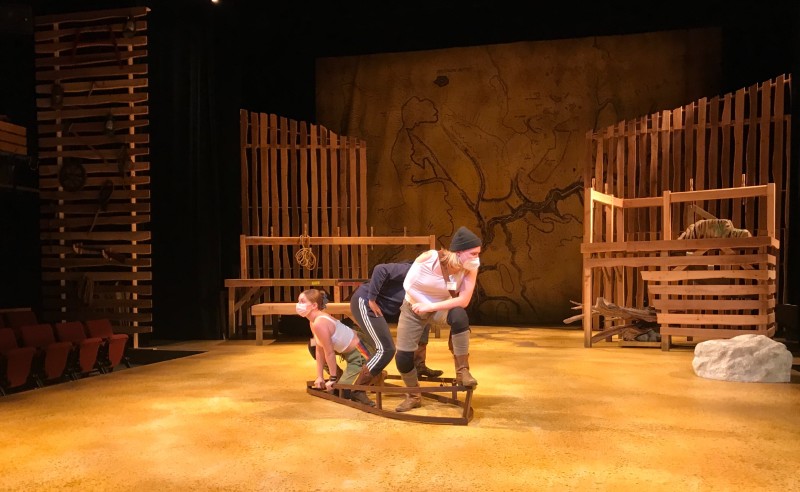
In 1869, John Wesley Powell led a 10-man expedition to map and gather information on a large swath of the American West, from Wyoming to the Grand Canyon along the Green and Colorado rivers. Powell was a geologist, naturalist, anthropologist, and veteran officer of the Civil War.
Playwright Jaclyn Backhaus takes a satiric look at this famous manly journey into the unknown by casting her play Men on Boats with 10 women.
Emily Lyon, a 2013 graduate of the University of Michigan, is directing a “non-man” cast in a U-M Department of Theatre and Drama presentation of Men on Boats, Nov. 11-14, at the Arthur Miller Theatre.
Lyon said she was intrigued by Backhaus’ idea of having women fill those positions that history had filled with men. She said she wants to fill that space and have her cast “become explorers and adventurers and stepping into that sense of bravado, letting 10 young women and non-binary actors own the stage in the way that men in the 1800s felt that they owned the land is a fun and bold project.”
Come to the Cabaret: Theatre Nova’s "Sing Happy" celebrates the songs of Kander and Ebb

The pandemic has been taking its toll on arts groups everywhere, but the determination to keep staging plays, singing, and dancing has not diminished.
Theatre Nova, a professional non-profit theater in the heart of downtown Ann Arbor, opened its season after a year and a half of darkened lights with the Michigan premiere of The Lifespan of a Fact, a provocative play about truth in journalism. Nova regularly brings new plays with provocative ideas to its small, intimate theater on Huron Street.
But Nova is taking two weekends to challenge its supporters to help raise money for a matching grant from the National Endowment for the Arts. The grant would help Nova to continue its Pay What You Can ticket pricing.
Nova is inviting audiences to come to their cabaret with the musical revue Sing Happy celebrating the music and lyrics of John Kander and Fred Ebb.
U-M plays up the humor and sophisticated fun found in Massenet’s opera "Cinderella (Cendrillon)"
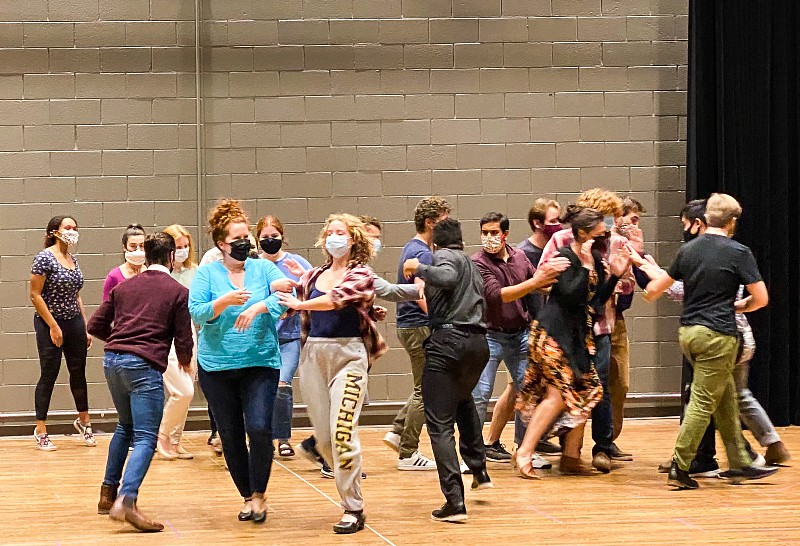
“Light, fairy tale, bubbly, and elegant” are words that Kirk Severtson uses to describe Jules Massenet’s opera Cinderella (Cendrillon in French).
The University of Michigan’s Department of Voice and the University Symphony Orchestra presentation of Massenet’s Cinderella (Cendrillon) will be staged Nov. 4-7 at the Power Center.
For music director Severtson and stage director Abbigail Coté, this famous story of a poor girl abused by her stepmother and stepsisters who triumphs by winning the love of a prince (with the help of a fairy godmother) seemed like just the right remedy following a year and a half of COVID restrictions and worries.
“We chose this piece for its theme and subject that was specifically post-COVID and not something set in a dystopian, nightmarish future. We chose something light, fairy tale, and bubbly,” Severtson said.
Cinderella may just be the oldest and most beloved of the classic fairy tales. It has been the subject of numerous versions and variations dating back to a tale told in China in the fourth century B.C. It was a Disney animated musical (and "Cinderella Castle" is a Disney trademark), a Rodgers and Hammerstein musical for television and later stage, several other films, and numerous ballets and operas. Massenet’s version, with a libretto by Henri Cain, premiered in 1899. A popular version by Gioachino Rossini premiered in 1817.
Coté has a theory about the story's longevity.
U-M production updates the Roaring Twenties-set musical "The Wild Party" for the Cell Phone Age
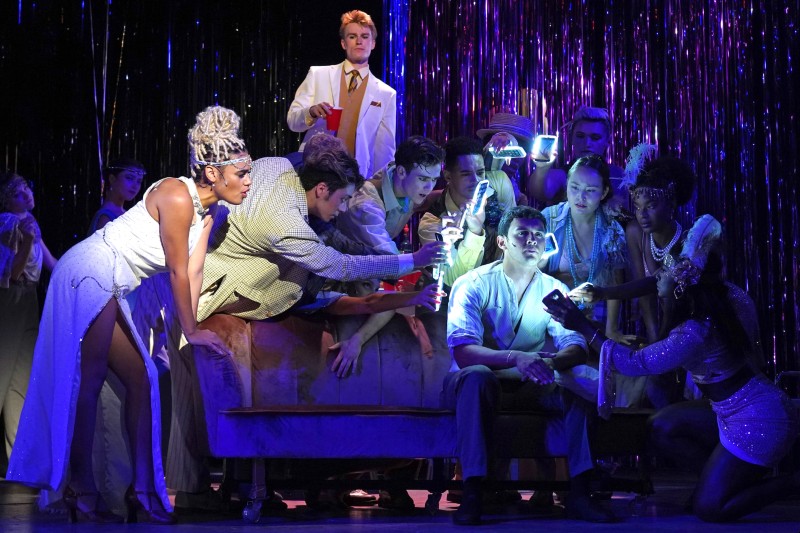
Joseph Moncore March’s 1928 book-length poem The Wild Party was a scandal at the time. March portrayed in rhythmic language the shifting landscape of sexual relations and raw desires in the Roaring ’20s as captured in a Hollywood party run amok. The book was banned in Boston and beyond.
The University of Michigan Department of Musical Theatre production of Andrew Lippa’s sung-through musical adaptation of March’s book is reset to portray a group of overprivileged Upper Eastside Manhattan teenagers.
Lippa is a 1987 University of Michigan grad who has had a very successful career as a composer and lyricist. He wrote the music and lyrics for Big Fish, The Addams Family, and three songs for You’re a Good Man Charlie Brown among others. The Wild Party premiered off-Broadway and won the Outer Critics Circle Award for best Off-Broadway musical and Lippa won the Drama Desk Award for best music.
The student cast brings high octane energy to the singing and dancing. The emotions run high in what is basically a complex love (or is it lust) triangle.
Encore Musical Theatre Company opens its new home and 13th season with "Smokey Joe’s Cafe"
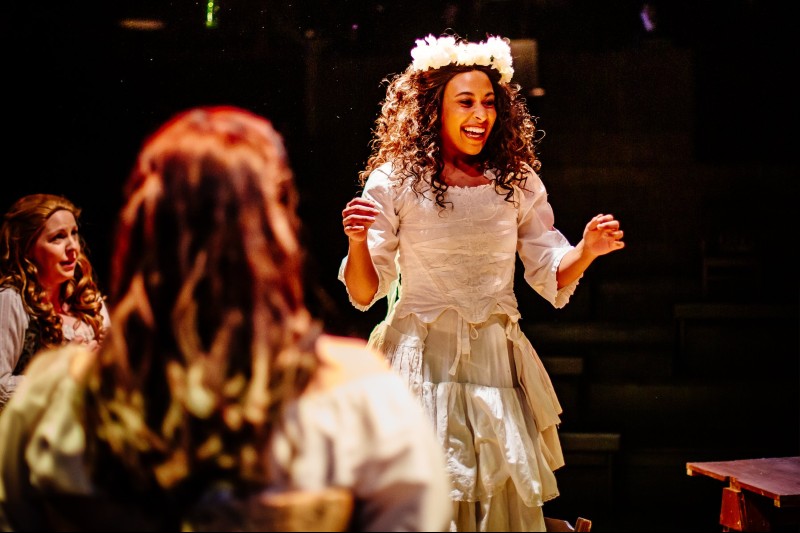
Live theater is back and the Encore Musical Theatre Company is celebrating the opening of its 13th season in its spectacular new space in Dexter and in the always rocking Smokey Joe’s Cafe.
Dan Cooney and company couldn’t have picked a better show to reignite live theater after the long pandemic drought than Smokey Joe’s Cafe, a revue tribute to the music of Jerry Leiber and Mike Stoller. It’s not the traditional musical that Encore does so well but is instead 90 minutes of pure energy, one great song after another by talented performers who take us back to those early days of rock 'n' roll and rhythm 'n' blues. Leiber and Stoller were there at the creation.
The duo of New York songwriters could and did write hit songs in nearly every genre from folk and country to rhythm and blues to the edges of pop opera. They wrote for such dynamic groups as The Drifters and The Coasters as well as for the distinct voices of the roaring Big Mama Thornton and the early soul sound of Ben E. King to Elvis Presley. And the hits just kept coming as the duo embraced the new music while also giving it their own unique voice.
Smokey Joe's is a roadhouse, the subject of one of Leiber and Stoller’s songs, and an appropriate setting for their take on the ups and downs of life and love. Though there is no storyline, director Dan Cooney’s staging suggests a loose interaction between characters from song to song. A small combo is set up as the cafe’s house band providing a rock-steady beat and great sound.


































